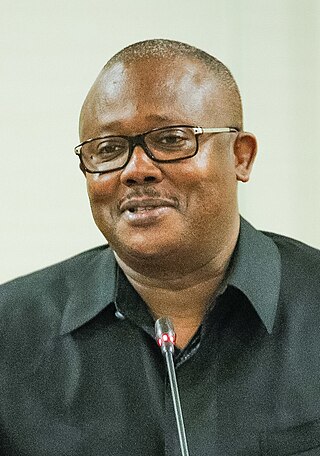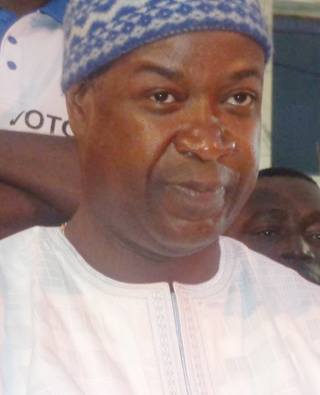Contents
| |||||
| Decades: | |||||
|---|---|---|---|---|---|
| See also: | |||||
Events in the year 2023 in Guinea-Bissau .
| |||||
| Decades: | |||||
|---|---|---|---|---|---|
| See also: | |||||
Events in the year 2023 in Guinea-Bissau .
Ongoing — COVID-19 pandemic in Guinea-Bissau

The politics of Guinea-Bissau take place in a framework of a semi-presidential representative democratic republic, with a multi-party system, wherein the President is head of state and the Prime Minister is head of government. Executive power is exercised by the government. Legislative power is vested in both the government and the National People's Assembly.
Soares Sambú is a Bissau-Guinean engineer and politician who was deputy of the National People's Assembly and minister of the Presidency of the Council of Ministers, an agency that accumulates the functions of deputy head of government.

João Bernardo "Nino" Vieira was a Bissau-Guinean politician who served as President of Guinea-Bissau from 1980 to 1999, except for a three-day period in May 1984, and from 2005 until his assassination in 2009.
Rui Duarte de Barros is a Bissau-Guinean economist and politician who has served as the prime minister of Guinea-Bissau since 20 December 2023. His previous positions include being the Minister of Economy and Finance, as well as being the Transitional Prime Minister of Guinea-Bissau from 16 May 2012 to 3 July 2014 following a military coup.

Umaro Mokhtar Sissoco Embaló is a Bissau-Guinean politician serving as the president of Guinea-Bissau since February 2020. He is a political scientist and military officer who previously served as prime minister between November 2016 and January 2018.
Augusto António Artur da Silva is a Bissau-Guinean politician who was the Prime Minister of Guinea-Bissau, appointed by President José Mário Vaz January 30, 2018 to April 16, 2018, to succeed Umaro Sissoco Embaló, who had resigned two weeks earlier.

Madem-G15, officially the Movement for Democratic Alternation, Group of 15, is a political party in Guinea-Bissau founded by former members of PAIGC in 2018, named for the 15 members who left the PAIGC. Notably, it won 27, the second most seats, of 102 seats in the 2019 legislative election of Guinea-Bissau in its first election showing. On 28 February 2020, Umaro Sissoco Embalo, a member of Madem-G15, took office as President of Guinea-Bissau in a contested election. The party supports former President José Mário Vaz in his dispute with reformist Domingos Simões Pereira.

Presidential elections were held in Guinea-Bissau on 24 November 2019. As no candidate received a majority of the vote, a second round was held on 29 December. Incumbent president José Mário Vaz finished fourth in the first round of voting, failing to progress to the runoff. Umaro Sissoco Embaló won the second round with 54% of the vote, becoming the first president to be elected without the backing of the PAIGC.

Nuno Gomes Nabiam is a Bissau-Guinean politician who served as the Prime Minister of Guinea-Bissau from 28 February 2020 to 8 August 2023.
Events in the year 2020 in Guinea-Bissau.

A coup d'état was attempted in Guinea-Bissau on 1 February 2022. A few hours later, president Umaro Sissoco Embaló declared the coup over, he said that "many" members of the security forces had been killed in a "failed attack against democracy".
Events in the year 2022 in Guinea-Bissau.

Snap parliamentary elections were held in Guinea-Bissau on 4 June 2023. Incumbent president Umaro Sissoco Embalo dissolved the parliament on 16 May 2022, accusing deputies of corruption and "unresolvable" differences between the National People's Assembly and other government branches.

The Inclusive Alliance Platform – Terra Ranka is a Bissau-Guinean political coalition formed for the 2023 legislative election and mainly led by the African Party for the Independence of Guinea and Cape Verde (PAICG).

On 30 November–1 December 2023, clashes broke out in Bissau, the capital of Guinea-Bissau, between government forces and units of the National Guard who had released two ministers accused of corruption from detention. The clashes led to the arrest of National Guard commander Colonel Victor Tchongo. President Umaro Sissoco Embaló described the events as an attempted coup. Following the clashes, Embaló ordered the dissolution of the country's legislature.
Events in the year 2024 in Guinea-Bissau.

Snap parliamentary elections are scheduled to be held in Guinea-Bissau on 24 November 2024. Incumbent president Umaro Sissoco Embalo dissolved the opposition controlled parliament on 4 December 2023, saying an "attempted coup" had prevented him from returning home from COP28 climate conference.

Presidential elections are scheduled to be held in Guinea-Bissau in November or December 2024. Incumbent president Umaro Sissoco Embaló is eligible for a second term.